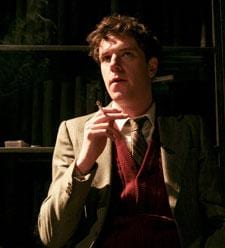During the second half of the film The Reader some Toronto theatergoers may get the strange feeling that they have seen this before in a somewhat different configuration. Like the recent Stephen Daldry film, Hannah Moscovitch’s East of Berlin, currently playing at Tarragon Theatre, deals with post-Holocaust events and chance meetings between opposite players, giving audiences a chilling look at ways in which Nazi Germany implicates us all within a morally reprehensible equation of sociopolitical chaos and terror. Where The Reader lapses into sentimental narrative closure, East of Berlin unsentimentally moves us toward a gripping ending that is superbly framed by lead actor Brendan Gall in an extraordinary performance as the son of a German expatriot who flees his family and attempts to invent a new life.
The shallow playing area — beautifully framed by set designer Camellia Koo’s wall of richly coloured and cluttered shelves — sends Gall’s intricate and idiosyncratic performance into high relief as he continually breaks the fourth wall and invites his enthralled audience into an extremely complex moral dilemma.
Costars Diana Donnelly and Paul Dunn expertly play Gall’s love interests with a mixture of playful abandon and heart-wrenching finesse. Replete with onstage same-sex blowjobs, kisses and superb writing that deals with the very conflicted position of a straight man who becomes intimate with a close male friend, parts of the script are titillating and infuriating exercises in homosocial dalliance. But when the beautiful young Jewish woman enters sexuality shifts and political upheaval reigns supreme.
Director Alisa Palmer has given her actors the freedom to traverse these slippery emotional, sexual and political slopes with sharp, nuanced characterization and graphic physicality that leaves one breathless with voyeuristic anticipation — much like the explicit intergenerational scenes between Kate Winslet and David Kross in The Reader. The script does tend to over rely upon an amazing skill for clever dialogue, but in the hands of Moscovitch this adds sheer entertainment value to extremely sensitive issues. The opportunity to see both treatments of post-Holocaust scenarios, on stage and screen, is a powerful and potent reminder that the repercussions of past atrocities are far from over.

 Why you can trust Xtra
Why you can trust Xtra


